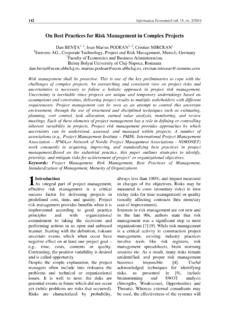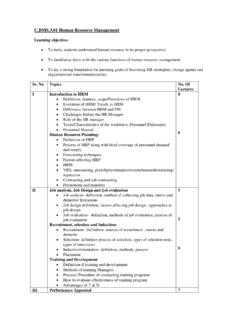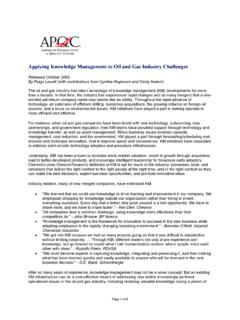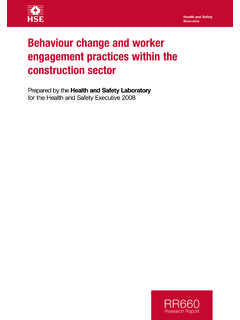Transcription of PROJECT RETROSPECTIVES EVALUATING PROJECT …
1 PROJECT RETROSPECTIVES : EVALUATING PROJECT SUCCESS, FAILURE, AND EVERYTHING IN BETWEEN 2005 University of Minnesota MIS Quarterly Executive Vol. 4 No. 3 / September 2005 361 FAILURE TO LEARN1 Life can only be understood backwards, but it must be lived forwards. (Kierkegaard)2 PROJECT managers are caught in a paradox. On the one hand, they are working too hard to pause and reflect on effective PROJECT management practices. On the other hand, such reflection and corresponding learning are key to better PROJECT management.
2 According to the widely-quoted Chaos Chronicles,3 only 34% of IT 1 Jeanne Ross was the accepting Senior Editor for this article. 2 The author gratefully acknowledges Barb Wixom, Mike Morris, Peter Todd, Steve McConnell, Jerry Deville, Jeanne Ross, Barbara McNurlin, and the reviewers for their helpful suggestions on improving this article. My sincere thanks to the graduate students that conducted, and the organizations that participated in, the RETROSPECTIVES that made this article possible.
3 3 Chaos Chronicles, Version The Standish Group International, West Yarmouth, MA, 2003. Standish Group definitions: projects undertaken by Fortune 500 companies are completed successfully. In other words, almost two-thirds of the 13,522 IT projects surveyed suffered from one or more of the following: total failure cost overruns time overruns, or a rollout with fewer features or functions than promised. The good news is that this 2003 result is a 100+% improvement over the 16% rate reported in 1994, and outright failures have declined from 31% to 15% Successful = The PROJECT is completed on time and on budget, with all the features and functions as originally specified.
4 Challenged = The PROJECT is completed and operational, but over budget, over the time estimate, and/or with fewer features and functions than initially specified. Failed = The PROJECT is cancelled before completion. Executive Summary R. Ryan Nelson University of Virginia The fact that the majority of IT projects fail on at least one measure of success, and that billions of dollars in PROJECT waste is reported each year, suggests that there is a critical need for improving the way we manage these projects. The sobering truth is that the secret to more successful PROJECT management has been right in front of us the whole time learning from the past.
5 A retrospective ( a postmortem) is a formal method for EVALUATING PROJECT performance, extracting lessons learned, and making recommendations for the future. A comprehensive retrospective considers three process-based measures of PROJECT success: whether it came in on schedule (time), whether it came in on budget (cost), and whether the requirements were met (product). It also considers three outcome-based measures of success: whether the resulting product or service was actually used (use), whether the PROJECT helped prepare the organization for the future (learning), and whether the PROJECT improved efficiency or effectiveness of the client organization (value).
6 This article presents several RETROSPECTIVES of IT projects to illustrate the importance of EVALUATING PROJECT success from these multiple dimensions, as well as from different stakeholder perspectives. Doing so can lead to some valuable lessons in the form of failed successes (process success + outcome failure), and successful failures (process failure + outcome success).2 PROJECT RETROSPECTIVES : EVALUATING PROJECT SUCCESS, FAILURE, AND EVERYTHING IN BETWEEN 1 PROJECT RETROSPECTIVES : EVALUATING PROJECT SUCCESS, FAILURE, AND EVERYTHING IN BETWEEN 2005 University of Minnesota MIS Quarterly Executive Vol.
7 4 No. 3 / September 2005 362 (challenged projects account for the remaining 51%). However, the fact that two out of three projects fail on at least one criterion suggests that there is a critical need to improve what is arguably the most important IT competency area: PROJECT Failure to learn from mistakes has consistently been a major obstacle to improving IT PROJECT management. As Boddie wrote in 1987: We talk about software engineering but reject one of the most basic engineering practices: identifying and learning from our mistakes.
8 Errors made while building one system appear in the next one. What we need to remember is the attention given to failures in the more established branches of engineering. In software projects, as in bridge building, a successful effort can do little more than affirm that the tools and methods used were appropriate for the task. By the same token, failed projects need more than explanation or rationalization if they are to teach any lessons.
9 5 RETROSPECTIVES A retrospective is a formal method for EVALUATING PROJECT performance, extracting lessons learned, and making recommendations for the future. The word retrospective means looking back on, contemplating, or directed to the past. In the IT industry, RETROSPECTIVES go by many names. One popular term is postmortem, from the Latin for after death. In addition to the obvious negative connotations attached to this label, IT projects don t, or at least aren t supposed to, end with death.
10 Rather, they should bring something to life. As an alternative, the Latin term postpartum, meaning after birth, is sometimes used, again with its own set of negative associations. Various branches of the military use their own terms: After Action Review or Post Engagement Redress (Army), Navy Lessons Learned or Hot Wash Up, and C-GULL (Coast Guard Uniform Lessons Learned). While each term has its following, the terms 4 As defined by the PROJECT Management Institute (PMI), a PROJECT is a temporary endeavor undertaken to create a unique product, service, or result.








